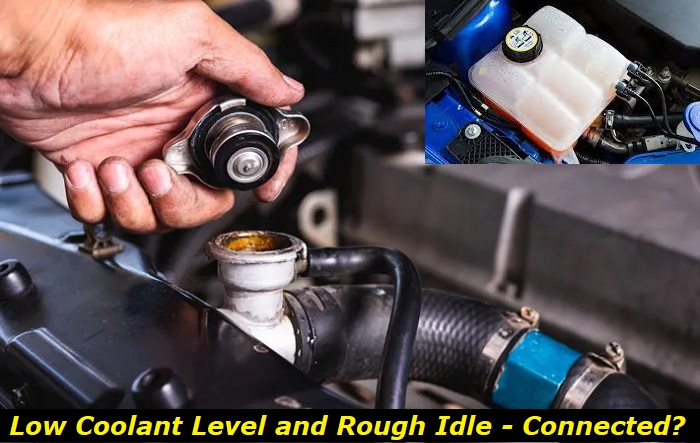The car engine is bound to become very hot during operation. It has numerous moving components, and there has to be a cooling mechanism; otherwise, the engine won't perform as intended. The engine uses engine oil to lubricate the moving parts, reducing the friction between these parts. The one mechanism car engines can't operate without is the cooling system.
Coolant level problems highlights
- Level of urgency:high
- Commonreasons:cooling system problems, leaks, coolant expands, circulation issues
- DIY diagnostics:quite complicated
- DIY repair:impossible
- Price of repair:$300 - $850
- Time for repair:3 - 9 hours
- If ignored:engine overheating and failure, cooling equipment problems

What is car coolant and what is its role?
The combustion chambers in the car engine can reach extremely high temperatures, as high as 4,000 degrees Fahrenheit. The optimal operating temperature of an engine is 200 degrees Fahrenheit. The high temperature means a system should remove the excess heat from the engine as fast as possible. This is why an effective cooling system is necessary.
Car coolant is a liquid made of glycol and water. The liquid is also referred to as antifreeze. It is called antifreeze because it doesn't turn into ice in winter. The glycol part of the coolant has anti-freezing aspects and prevents the coolant from boiling even when extremely hot.
The engine block and the cylinder head have numerous holes and channels through which fluids flow. Some of the smaller channels are designated for the transportation of the coolant. They pick up the excess heat in the block and take it away to the radiator. A fan blows the radiator to lower the temperature of the coolant before it can go back to the engine again.
The cooling system of a car is sealed. This means the coolant should not escape either through evaporation or leaking. The coolant level should be constant if everything works according to the design. But in real life, the coolant level drops over time, but at a minimal rate. However, there are instances when the coolant can drop drastically. This should be investigated and resolved immediately to avoid catastrophic engine and car damage.
Can a low coolant level cause rough idle?
As observed earlier, car coolant should be maintained within the recommended level. The expansion tank, or coolant reservoir as it is called in some quarters, is under the hood, and the maximum and minimum level points are clearly indicated. When the coolant level goes below the minimum or completely dry, serious repercussions are bound to arise.
Low coolant levels will result in the engine temperature exceeding ideal operating conditions. This will cause engine parts to expand, burn, and get damaged. One of the components to suffer will be the head gasket. The head gasket seals off the water, oil, air, and fuel channels so that none mixes with the other until the combustion chamber.
Yes, low coolant levels can cause an engine to idle roughly. The fuel, coolant, and oil system will get messed up when the head gasket is damaged. For the pistons to perform as designed, the combustion chamber's compression must be right. The damage to the gasket means compression is lost, which is why rough idling is experienced.
When the car idles roughly, one of the things to check is the coolant level. If there is no or little coolant in the expansion tanks, then there is a good chance the head gasket is blown and leaking.
Overheating of the engine causes the gasket to get damaged, and coolant will enter the fuel and oil channels, causing the engine to misfire and shake. You must act fast because prolonging this problem can lead to engine stalling or even knocking. If the latter happens, you will be in big trouble because a new engine will most likely be needed.
Why is low coolant level dangerous?
If you fail to address the problem, you might be forced to foot a bill so large that at times it could not be worth the trouble. Here are the repercussions you risk running into when you overlook rough idling caused by low coolant levels.
- Blow the head gasket - Low coolant problems can be arrested early by topping the coolant reservoir as recommended or when its level drops. Failure to add coolant will cause the gasket to blow, which is when a flood of issues will flow.
- Engine overheating - Not enough coolant means the engine is not getting cooled, leading to overheating. To continue operating the vehicle might cause the pistons to seize. Permanent damage to the pistons and the cylinder might eventually force you to replace the entire engine.
- Engine stalling or knocking - Overheated engine can stall or knock. This happens after immense damage has already happened. Some vehicles, however, have a safety mechanism where the engine is shut off to prevent further damage. Of course, the benefit of this is that you get to save the engine a ton of pain and money. However, the shutting off can happen in the middle of nowhere at the most inconvenient time.
What are the symptoms of low coolant, and is leaking into the engine?
When the coolant leaks because of a broken hose or radiator fault, the engine will be affected, causing improper cooling. This will then cause overheating of the engine, leading to damage to the engine and other systems.
When the coolant is leaking, or its level drops, and this gets accompanied by rough idling, you will need to be more worried. When you notice the car's rough idling in the morning, you may notice the following symptoms if it has something to do with the coolant.
You should regularly check the coolant level in the coolant reservoir. If it has gone low, check under the car to check whether there is a puddle, or the cooling system hoses are wet. If the hoses are wet or there is coolant on the ground.
1) White smoke from the exhaust
We noted earlier that car coolant is made of glycol and water. The coolant will leak into the engine through a damaged head gasket. Water will become steam when the coolant enters the cylinder and mixes with the air-fuel mixture. The steam will be emitted from the exhaust as white smoke. The volume of the leaking coolant will be chronically low for this to happen.
2) Low compression hence rough idling
A damaged head gasket leaks, making the combustion chambers ineffective. This is what causes the engine to idle roughly. The engine can knock or stall when this problem is ignored. A leaking gasket involves a lot of work. You will need to disassemble the engine, remove the head and replace the head gasket. You may also need to put in new piston rings and resurface the head if the damage is extensive. In severe cases, the head or the entire engine might need to be replaced.
3) Engine overheating
Whenever you notice your engine idling roughly, you may also have noticed that the vehicle overheats easily. This will be evident if you drive uphill or if the vehicle is loaded. The engine overheats because the gasket is blown, so the pistons and other parts work twice harder to create the required torque. The coolant, on the other hand, is low, and cooling the engine becomes almost impossible. This leads to the engine parts overheating, leading to the engine knocking.
As a first aid measure, you can add coolant. The additional coolant will start cooling the engine if it's a leakage. Never open the radiator when the engine is hot. Add the coolant into the reservoir and let the engine cool a bit before continuing your journey. Adding coolant might cool down things but it is never the solution if the level keeps dropping and the engine overheating. Take the vehicle to the professionals.
4) Contamination of engine oil
A bad gasket causes oil and coolant to mix. Remember, coolant contains water; as you know, water and oil never mix. When the coolant leaks through the damaged gasket, it can enter the oil follicles in the block and head, ending up in the sump. When the oil is contaminated with water, it loses its lubricating effectiveness. This contamination can also cause rough idling. You will need to disassemble the engine to drain the water and replace the damaged gasket.
Conclusion
Engine coolant is a vital fluid in the operation of the car engine. Leaving the engine to run dry or low on coolant is a very big risk since you might end up incurring an incredibly high repair bill. Whenever you notice your car is idling roughly and the coolant level is low, immediately have a professional mechanic attend to your vehicle. Ignoring this problem can easily cause the engine to stall and knock.
About the authors
The CarAraC research team is composed of seasoned auto mechanics and automotive industry professionals, including individuals with advanced degrees and certifications in their field. Our team members boast prestigious credentials, reflecting their extensive knowledge and skills. These qualifications include: IMI: Institute of the Motor Industry, ASE-Certified Master Automobile Technicians; Coventry University, Graduate of MA in Automotive Journalism; Politecnico di Torino, Italy, MS Automotive Engineering; Ss. Cyril and Methodius University in Skopje, Mechanical University in Skopje; TOC Automotive College; DHA Suffa University, Department of Mechanical Engineering






Add comment